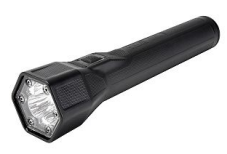Wouldn't it be cool if your could recharge your portable devices in 90 seconds?

Over the weekend I've had the opportunity to play with a tactical flashlight powered not by batteries but ultra-capacitors. The advantage is that unlike rechargeable batteries, ultra-capacitors literally take seconds to recharge. Wouldn't it be cool would it be to have a cellphone or notebook/netbook that recharged that quickly.

But the part of the flashlight that really interests me is the ability to recharge the light from a completely discharged state in 90 seconds. That's right, a minute and a half. I didn't believe it initially, but I've tested it and the claim is spot-on. 90 seconds charge time equals a total running time of 120 minutes. And the charger isn't mains powered either, it's a 12V DC charger that runs from a car cord.
The energy storage system, called Flashpoint and developed in partnership with IVUS Energy Innovations makes use of ultra-capacitors that is rated for 50,000 charge/discharge cycles with virtually no degradation (it retains 96% of its peak capacity).
Now, I know that there's a difference in power consumption between a flashlight and a notebook, and that there are issues in getting the technology ready for consumer electronics, but this technology is certainly interesting. When it comes to portable devices, the battery is a weak link. Long charge times can be a major pain in the rear, and even the best batteries seem to degrade over a few years to the point where they need replacing. This is becoming a bigger problem as vendors make is harder to replace the battery.
Having played with this technology, I certainly think that it has the legs to make big strides into consumer electronics.
Fast recharge times, high charge/discharge cycles, virtually no performance degradation, land landfill ... what's not to like. Watch out Li-Ion technology, your days are numbered.